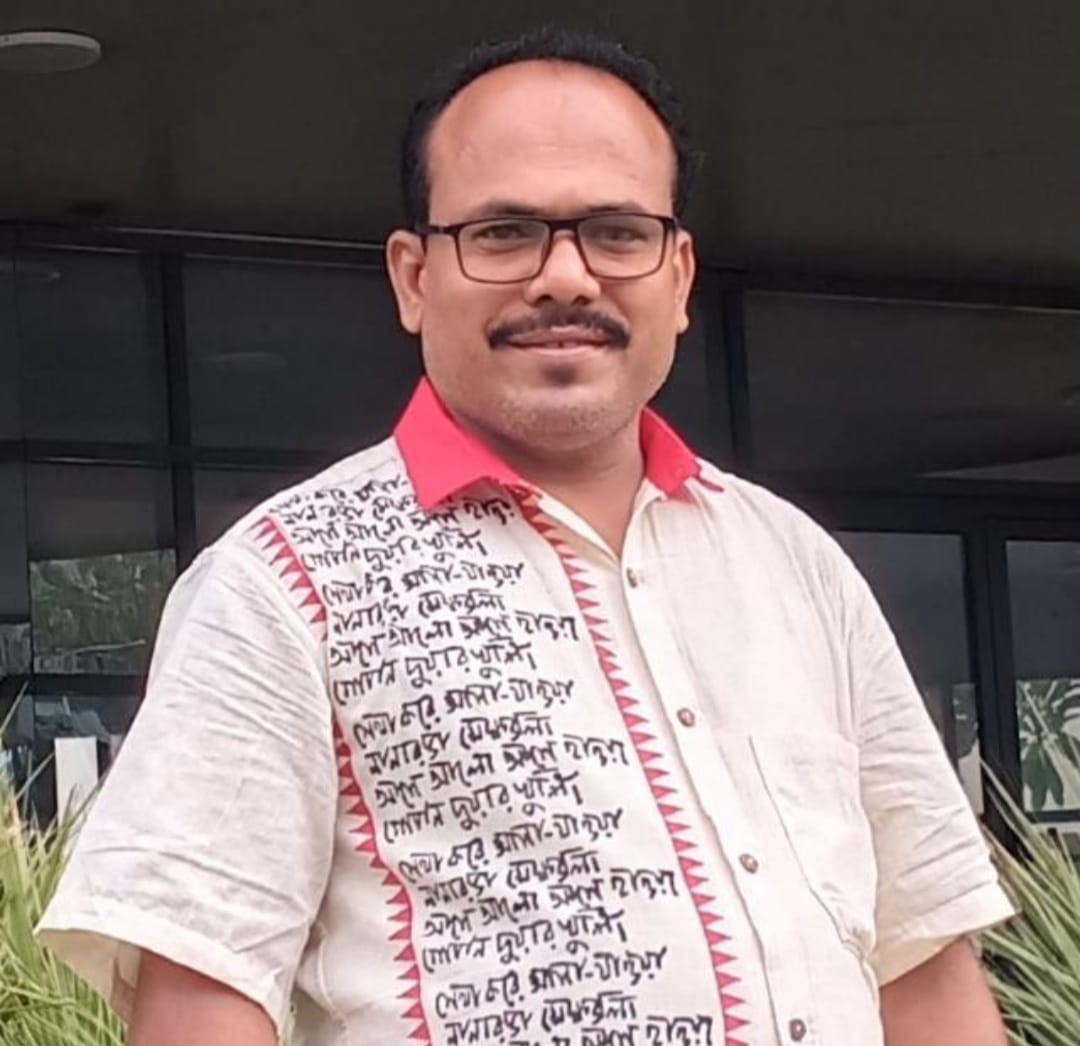Translated from the Marathi by Santosh Rathod
Train To Dungeon
When does a train to dungeon
Without windows and gates depart?
What’s the departing time of this damn wagon?
Who all are them,
Who crammed inside?
It would halt at an unknown destination.
Amen.
Dimness of headlights
Of the train of darkness
Emitting dark smoke to the darkest night
Charcoals of darkness fueling the black engine
Motorman of darkness navigating along the darkest tracks
Signals of darkness sending out to the darkest station
Blind watchmen guarding the gloomiest station
The rail wheels continuously grind and wear away
And there, the sparks are flying away
That’s the only illumination, only hope.
Milling And Digging In Progress
The old walls of villages I am cleaning
That’s the only work I got to do
Several diverse pictures inscribed on the walls
I commenced it today
Milling every layer of an epoch of crust.
After my palms blistered
I found a cow and a calf beneath
I gave them fodder
And the pair moved to a cow-shelter
A kilo of cow-dung
And a liter of cow-urine is being sold
Their glory, majesty, are being preserved
Fasts are being observed
Legacies bequeathed.
Thereunder surfaces a plow-borne-farmer
I inquired about his lands
He’ll get nothing though
He hopefully heads towards Paunar Ashram.
Then a dead Gajendra is found
Black skinny carcass lay in a lake
Perhaps his leg has been caught between a crocodile’s jaws
A lotus sprang from his trunk,
He died, it is said, while offering it to an oyster white-bearded old man whom he mistook for Brahma.
Deep down a lamp is discovered
That is full of oil
And a wick in place
Looking for a spark.
As I rubbed the wall deeper, it sparked
And smoldered like ammunition.
The lotus disappeared,
And the swamp had grown.
The wall is just like a country’s map.
I continued to scrape it until a river of blood flows from my palms
And I offered fervently flowers to the source of the river.
It was the tale of the walls
Yet again, who’s dug the soil here?
A call of truth, it is said, is sown over there.
After an eon
Here too,
The sites would turn into quagmires.
Here too,
A cluster of symbols would be buried.
Here too,
A cadaver of a bearded old man would be discovered.
Bullshit
There was bullshit before the universe
There is bullshit after the universe.
Is there anybody who doesn’t have bullshit?
Each page of the epic was written out of bullshit.
Deities are created out of bullshit.
There was bullshit before Tilak,
And what remains after Tilak is bullshit.
Bullshit is the answer to the mean and manipulative ideologies.
Savarkar had bullshit
The same was handed to Godse.
Godse shot bullshit
Whose goal was bullshit.
Bullshit is absolute power
And fools, who rule,
Grab votes
Claim ownership over widows.
Bullshit is your meadow,
Your Kingdom, your Emperor.
Creator sleeps beneath netherhair
Where bullshit commands
Bullshit is thine; bullshit is mine
Hence do not charge a fine.
Don’t wipe out the scriptures
For that beget and structure the bullshit.
Bullshit alone is the element
That governs your lives
And shelters like hives.
Rest assured
Bullshit can equal missiles
Once rockets are loaded with bullshit
The whole world will be destructed
Barring the bullshit.
Man should assemble a tail of bullshit
Let’s eat bullshit here
And spread it everywhere
Bullshit is the essence of the universe
Bullshit is the Trinity
Bullshit is the only hope
For climbing a developmental rope.
Chhaboo
1.
Chhaboo, you visited the shop
For getting the blouses stitched
Because of you, your friends followed
In that crowd, you were the only memorable face
Though they all had good figures,
Your heart was clear and pure.
You looked swarthy
And a face full of pits and scars
But your tongue was sweet
Friendly was your demeanor.
You, a co-dancer in Tamasha,
Stayed unemployed
Since the Haousa’s and Manjula’s
Tamasha shut down.
The rent of your room was long pending
Somehow you managed thanks to your previous small savings.
2.
You knew new steps of dance
And in your mistress’s absence,
Taught the new girl dancers.
You never had full opportunities,
And remained only a supporting dancer.
During sensuous performances of Lavani,
If the frontline dancers missed any beats, or expressions due to their flickered minds,
You used to dexterously correct their dance steps
And saved their grace.
During and after Tamasha shows,
You had watchful eyes on
Whether nothing lay behind after packing up Tamasha.
You protested against the practice of defloration ritual.
You shooed away all the ruffians loitering around the Tamasha.
You resisted the private meetings with girl dancers that spoiled the art.
From side artists to central ones,
All respected your words.
During fair seasons you used to
Go on concert tours for two months.
3.
You didn’t get a partner of your choice.
You’re living alone like a hen, a female parrot in a cage.
You had a cat, which drank half a liter of milk a day
And Bhalu, a dog, which gobbled three bhakris a day.
People marveled at the obscure experiment of feeding them from your foods and staying yourself half-fed.
On every Diwali and Rakshabandhan
You used to pray for and tie rakhis to your neighbors, acquaintances.
You had to live alone in a room
And establish a good relationship with the whole world,
Which existed outside though.
Chha-Boo,
Only two syllables of your name
Were known to them
And rest, obscure.
Your village stood in a corner
Somewhere towards Beed
In Marathwada.
4.
You liked radio enormously,
But couldn’t buy it in a lifetime.
You would listen avidly wherever it was heard.
Chhaboo, you used to be lost yourself
When its sound emanated from Sindhi’s Bakery Shop.
A loafer sold you a two-in-one radio with a recorder for just two hundred rupees,
Much cheaper than a brand new one.
It was a stolen good,
And you’re stuck in the crime.
Police harassed you badly
The radio case lasted for seven years
Though, finally, you’re proved innocent.
But you stopped listening to the radio,
Also stopped watching movies in theaters,
Which you had now and then visited.
5.
Once I lifted your pair of anklets,
And felt as if I held up a heavy bag of ration.
“How heavy these are!”
“Our stomachs are tied at the ankles.
No one can understand the kind of labor we put in.
It’s not the bells, but our hunger bells.”
Your old partners, mridangist, drumist
Would walk clumsily
And drink without-milk teas made in a tin pot
And said, “Our life has become colorless
When the centers of Tamasha turned into brothels,
And the women dancers on the stage are forced into beds.
Where is the art here, brother?”
Good fortunes and prosperity of your ancestral profession of singing and dancing stepped in the houses in the cities.
The art in your navvari damned
And their bare arms, open navels acclaimed.
Chhaboo, they say, your songs spoil the art,
And their performances fetch fame.
6.
Your room owner threw away your belongings,
Uncontrollably you wailed then.
He was reluctant to release your belongings,
Though handed over later.
You never wanted
Still
Eventually
Alas, you had to step into the center of art!
7.
One late night,
An uproar rose in the center of art.
Armed force personnel from the camps
Prepared to take away the girls in their vehicle,
Then you caught hold of a slaughtering knife
And also gathered courage and saved those young girls.
But in your valiant effort
Three of the jawans lay dying.
Finally with the weapon,
You surrendered at the police station.
And there, the police party was listening
Lata Mangeshkar’s song on the stolen two-in-one radio (For which you had been alleged once)
“Ye mere Vatan ke logo
Jara ankho me bharlo pani
Jo shahid huye hain unki
Jara yaad karo kurbani“
(Oh, fellow countrymen,
Fill your eyes with tears,
Remember the sacrifices
Made by the martyrs)
Chhaboo, the song then
Was yielding strange meanings.
Hirabai Zafarmiayan
1.
Zafarmiyan chanced upon you
During the pilgrimage along with Hindu companions
He was aimlessly wandering around the Bhavani pandal at Tuljapur.
Leaving his friends, he alone awaited
For a while
For you
and
took you to Lajpatwadi
for taking care of his five children.
His wife left this world
And at once you became a mother of
Unclad orphans— Afreen, Amreen, Arman, Ishaq, and unweaned Lalmohamed.
You Hirabai became Zafarmiyan’s wife as if a coconut were hanging onto a date palm.
2.
Formally you became a Muslim in middle age and started reading
The Kalma, Alif Bey.
Every day, the old Maulvi would come coughing to preach The Quran.
Your training and my school ran simultaneously.
In the courtyard, we sat together with slates.
And you would read the Kalma your way
And would ask, “Santosh, is it fine?”
I just said yes, even if I didn’t comprehend it.
I would tell you, “I like the winding and twisting path”
And you would take it for something
And cry your eyes out.
3.
Those five of yours took good education,
And then jobs,
And you got them good spouses too
To leave you both alone behind
You lie in Zafarmiyan’s house,
as if, time and again,
Plastering clay slipped off
Crust fell off the plastered walls.
Asthmatic, Zafarmiyan would get choked with coughing.
And soon your face turned frightened.
You hurriedly ran to get medicine.
All five dumped their parents
You deeply felt disheartened.
And then, you narrated the lives of Zafarmiyan and his wives.
4.
Zafarmiyan, the Jagirdar of Lajpatwadi,
Unnecessarily picked fights with his wife’s brother,
And knives, scimitars unsheathed.
“The entire world on one side, wife’s brother on the other.”
In the courtyard, Zafarmiyan and his wife (Vaida),
Who had returned from the Ram Navami pilgrimage,
Covering themselves,
Were fast asleep with five children in the middle.
That night
The swords of his wife’s brother attacked the covered body
And his own sister’s torso in lieu of Zafarmiyan’s mistakenly came under the blade of his sword.
None from his community showed up to console Zafarmiyan
Who took the refuge of Hirabai for several years
And both, Zafarmiyan and Hirabai, stayed settled like the garbage, the remnants of floods.
One day, he too was called upon by the Prophet.
And the Maulvi, who gave you the oath of Islam, is not alive either.
Now, again, you are
Sitting in front of Tuljapur Bhavani,
selling the kumkum and the green bangles,
The signs of marriage-hood.
On a meeting after twenty years
You had the only question for me
“Brother, will people burn or bury me?
Inscribe my name, if you could, at the graveyard of your village.
And tell the world
That’s what had happened here.”
Also, read an insightful take on the Galician poet, Rosalía de Castro, written by Leyre Villate Garcia, and published in The Antonym.
Follow The Antonym’s Facebook page and Instagram account for more content and interesting updates.
For the month of September, The Antonym will be celebrating Translation Month to mark International Translation Day celebrated on 30th September. A number of competitions, giveaways, podcasts, and more have been lined up for the occasion. Please join The Antonym Global Translators’ Community for updates!



























0 Comments